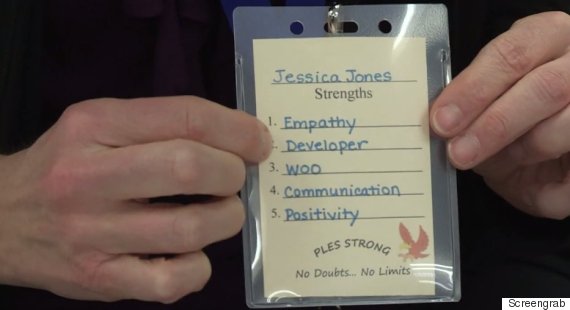
Students who distract peers with stories and jokes aren’t labeled “class clowns” at Ducketts Lane Elementary School in Maryland. Instead, they’re lauded for having “presence.”
And when parents and students meet with teachers to discuss student progress, teachers rarely focus on students’ deficiencies. Instead, they discuss the students' major strengths and how they could work to grow those strengths.
For nearly two years, this elementary school in the Howard County Public School System has been participating in a districtwide initiative designed to highlight the personality strengths of students and teachers. The initiative is part of a partnership with Gallup that began in 2013 to boost student and teacher strengths and engagement. Preliminary results show the approach seems to be working so far.
“You can see the confidence in the kids,” said Rachel Edoho-Eket, a Kindergarten Instructional Team Leader at Ducketts Lane. “If you were to ask a fourth- or fifth-grader, ‘What are your top strengths,’ they would be able to recite it. If you were to ask me when I was that age, I’d be like, ‘I’m nice and uhhh….”
Ducketts Elementary school is one of six “model” elementary schools in the Howard County school district, a suburban district that serves over 50,000 students K-12. The fruits of the Gallup partnership are present throughout all of the district’s 76 schools, but most fully integrated into its model schools, which pilot new initiatives.
As part of this effort, HCPSS gives all employees and students in grades five through 12 surveys to measure their levels of engagement each year. All district teachers and students in select grades at model schools are also given tests that identify their personality strengths. Once these strengths are identified, it is the job of strengths specialists –- who are employees at the district but trained by Gallup -- to help administrators and teachers find ways to build upon these talents.
The idea is that if staff and students feel recognized for their strong points, they will feel more engaged at school. When students feel more engaged at school, their academics improve, Gallup research shows. When teachers feel more engaged at school, they are more likely to thrive at their jobs.
“School improvement used to be: Here are our standardized test scores, what are we going to do to move kids? Now the process is much more dynamic,” said Rebecca Amani-Dove, communications director for the Howard County Public School System. “There’s not just a focus on academics … [there’s focus] on the well-being of staff and organization."
Between 2013 and 2014, average levels of staff engagement increased from 34 percent to 40 percent. Engagement levels of students hovered around 54 percent both years.
Teachers and support staff have embraced the new emphasis on strengths development, even if there was some pushback at first, said Lisa Boarman, coordinator of school counseling for the district.
“There were a few [teachers] who were skeptical, like, 'Who’s going to see my results?'” said Boarman, who has been trained as a strengths specialist. Some staff members were also worried it would reflect poorly upon them if they weren’t shown to possess certain strengths, she said.
Overall, though, Boarman says she thinks the strengths development process has helped improve staff engagement, albeit not overnight.
“Some people have posted their strengths in the signature line of their email,” said Boarman. “The biggest thing for me is how this process drives employee engagement. If I get to go to work and do what I do best every day and utilize my strengths, I’m going to go home and feel good.”
At model schools, students have also embraced this new approach, said Edoho-Eket. Teachers wear lanyards that present their top five strengths. Fourth- and fifth-graders have their strengths displayed on their desks.

A HCPSS teacher sports a lanyard with her top five strengths. Credit: Terry McClung
“It’s nice when you have information about yourself that you can latch onto,” said Edoho-Eket, whose personality test describes her as a maximizer (“by nature I look at other people's strengths around me”), an arranger (“I like to organize and plan but I have a flexibility piece”) and a communicator (“I love to write and do presentations”).
Schools have also developed specific engagement strategies as a result of their Gallup survey results. At Ducketts Lane, leaders are working to help staff and students feel more recognized.
“You’re going to find some schools where you’ve got the right leadership and teachers feel supported and students feel like they’ve got a lot of options and people are working with them,” said Connie Rath, vice chair of Gallup Education. “There are other schools where it’s a pretty different story.”
She continued, “[HCPSS leaders are] paying a lot more attention to the type of culture they want and what they want to see for students in the future.”
